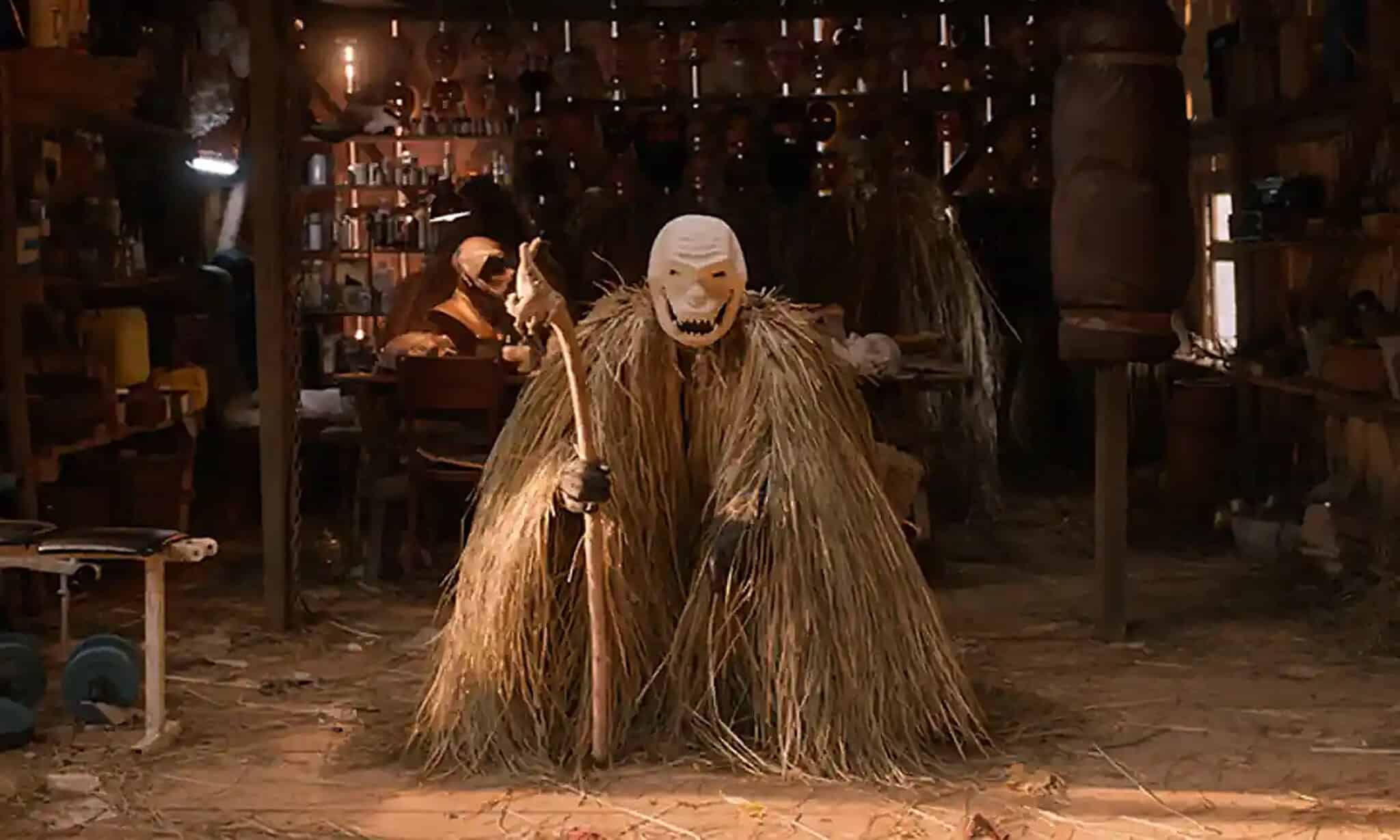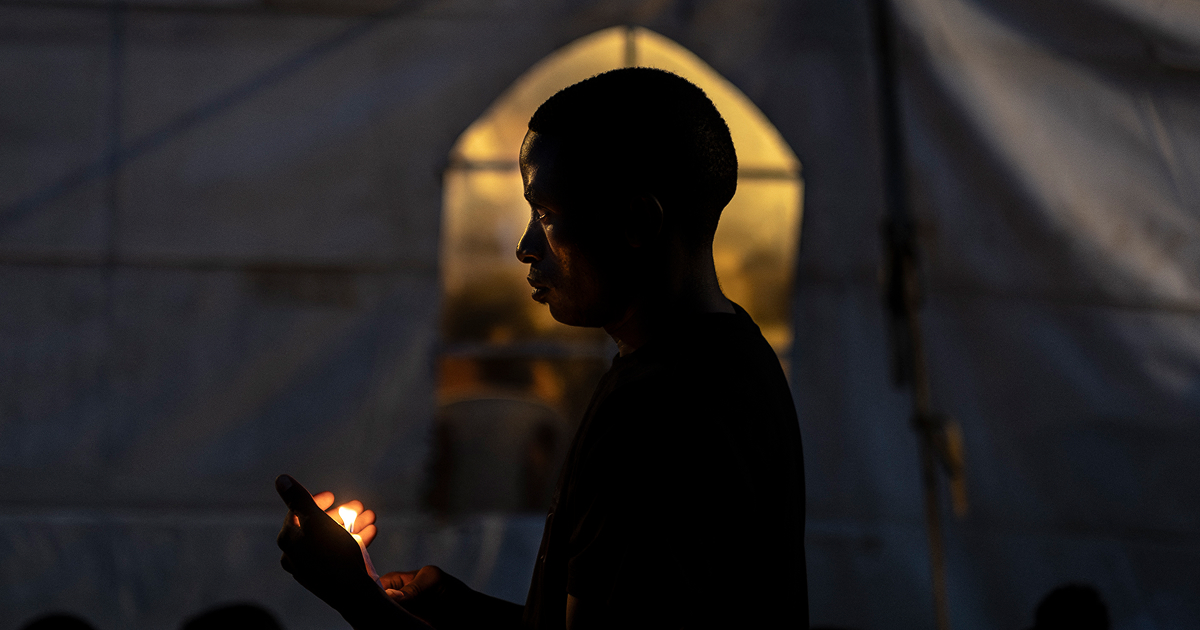Julia Hamilton is gripped by Ukrainian crime thriller Pamfir.
This stunning film is the feature-length debut of Ukrainian director Dmytro Sukholytkyy-Sobchuk, with the actor Oleksandr Yatsentyuk playing the eponymous leading role of Leonid Pamfir, which means “stone” in Ukrainian, or, perhaps, “rock”.
Pamfir himself is as solid as his nickname, a veteran smuggler who, in an attempt at reform, returns home at the opening of the film to find his teenage son, Nazar, (Stanislav Potiak) making costumes for the local carnival, Malanka, a festival based on a Christianised folk tale of pagan origin.
Malanka is a big deal in this part of western Ukraine. Short plays, sometimes with the theme of holy sacrifice, are staged by masked characters wearing African-looking straw skirts. In these plays, characters lose everything dear to them and then rise again – like Malanka herself – rather an appropriate model for this film in which a father will sacrifice himself for his son. A point not lost, I imagine, on the director.
Nazar is thrilled to have his father home, even if he doesn’t know for how long, and Olena (Solomiya Kyrylova) Pamfir’s long-suffering wife, is ecstatic, too, not just for herself but because their boy Nazar is out of control. He needs his father.
As if to demonstrate quite how out of control he is, Nazar sets fire to the church building, presumably in an attempt to destroy his father’s papers which have been left with the pastor. In doing so, however, he unwittingly lights the fuse that will blow up his entire family.
The church building – more of a large shed – is owned unfortunately by the area’s mafia boss, always cringingly referred to by locals as Mister Oreste. Oreste, with his lust for power and the obvious pleasure he takes in the suffering of others, could easily have been the commandant in a concentration camp.
Organised crime is in charge of everything in this region, including the Church, which appears to have precious little authority in the village. “Where was God when we needed him?” Pamfir asks his wife. Olena replies that God “allows her to transform pain into fuel”. Her faith seems to hark back to another age but Pamfir’s cynicism masks a powerful belief that good will prevail if he only tries hard enough. Olena trusts God, Pamfir trusts nobody.
Their diametrically opposed beliefs present a kind of snapshot of the history of Ukraine under Soviet rule when the state attempted to crush not only the Church but also festivals such as Malanka, peculiar to this part of the country and cherished as a result. Olena has the simple and pious faith of previous generations, like the holy wanderers whom Princess Mary attends to in War and Peace, but Pamfir’s world view, on the other hand, has been distorted and bent out of shape by his experience of trying to be a decent person in a dark and difficult world. Malanka, a death and rebirth story similar to that of Persephone and Hades, clearly means much more to Pamfir than his wife’s precious church, a form of Protestantism that seems to have taken root in western Ukraine. Malanka is kidnapped by the devil, but when she escapes she brings the spring with her and everything that means in terms of a change of heart and hope for the future. This is the model that Pamfir relates to.
When Pamfir accompanies Olena to the church concert to see Nazar perform in the choir, it’s obvious to the viewer how much their beliefs diverge. Olena, her hair tied neatly back under a kerchief, keeps gazing hopefully at her husband during the show as if willing him to revere what is on offer here in the same way she does, but Pamfir is annoyed with his son for not singing and ignores Olena.
Oreste loathes Pamfir and now has the perfect excuse to ruin him, but instead of maiming or murdering him as punishment for the damage done, Oreste makes him undertake a dangerous smuggling job, which Pamfir vows will be his last, consisting of journeying through an underground tunnel that connects Ukraine with the Romanian border and leaving the plastic-wrapped parcel (presumably heroin) given him by Oreste at the other end.
Oreste’s other stipulation is that Nazar must accompany his father, busting apart Pamfir’s belief that his son doesn’t really know what he does for a living.
We watch as the two of them, still in their Malanka costumes, make their way towards the tunnel through the silent, eerie woodland, pushing each other playfully from time to time like a pair of schoolboys on an outing, the deep silence punctuated by the uncanny sound of a wolf howling.
This receding view of father and son is the last happy moment of their life together.
In a grotesque plot twist, Pamfir is shot and wounded by soldiers from the army as he enters the tunnel but hauls himself onwards collapsing just before he reaches the Romanian side.
His final words to Nazar exhort him to give himself up to the Romanian authorities, presumably in the hope that he will be given asylum and a chance of the new life his father so passionately wants for him. The new life that was never going to happen in the old village, however hard Pamfir tried.
This film was in its post-production phase when Russia invaded Ukraine in February last year and therefore doesn’t directly reference the war as such (apart from the odd mention of Russian aggression in the shape of the annexation of Crimea in 2014).
Nevertheless, a feeling of violence is immanent in everything to do with the community that Pamfir returns to. The natural world of the village is portrayed as red in tooth and claw, but so is Oreste, whose wicked demands have deformed the lives of everyone he has contact with.
Pamfir bravely tries to contend with Oreste but we know he will lose.
And yet this career criminal, whose own life has been tragically shaped by violence, somehow continues to believe fervently in the possibility of a different outcome for his son. It is precisely this longing for his son to have what he himself has been unable to have which gives the film its undeniable raw power.
Pamfir had considerable success on the festival circuit in 2022 and it’s easy to see why. Not only is the subject matter of Ukraine fresh and new to audiences in the west, but the dynamic cinematography is stunningly skilful. The camera work sets off the sublimely beautiful and moody landscape to best advantage, at the same time emphasising its utter loneliness and isolation. A lot of scenes are shot in one continuous take with characters weaving in and out of view, plunging the viewer into the lives of the characters.
Described elsewhere as a gangster movie, this is more of a moral fable than anything else.
Pamfir is in cinemas nationwide.
<em>Julia Hamilton is gripped by Ukrainian crime thriller Pamfir.</em>
This stunning film is the feature-length debut of Ukrainian director Dmytro Sukholytkyy-Sobchuk, with the actor Oleksandr Yatsentyuk playing the eponymous leading role of Leonid Pamfir, which means “stone” in Ukrainian, or, perhaps, “rock”.
Pamfir himself is as solid as his nickname, a veteran smuggler who, in an attempt at reform, returns home at the opening of the film to find his teenage son, Nazar, (Stanislav Potiak) making costumes for the local carnival, Malanka, a festival based on a Christianised folk tale of pagan origin.
Malanka is a big deal in this part of western Ukraine. Short plays, sometimes with the theme of holy sacrifice, are staged by masked characters wearing African-looking straw skirts. In these plays, characters lose everything dear to them and then rise again – like Malanka herself – rather an appropriate model for this film in which a father will sacrifice himself for his son. A point not lost, I imagine, on the director.
Nazar is thrilled to have his father home, even if he doesn’t know for how long, and Olena (Solomiya Kyrylova) Pamfir’s long-suffering wife, is ecstatic, too, not just for herself but because their boy Nazar is out of control. He needs his father.
As if to demonstrate quite how out of control he is, Nazar sets fire to the church building, presumably in an attempt to destroy his father’s papers which have been left with the pastor. In doing so, however, he unwittingly lights the fuse that will blow up his entire family.
The church building – more of a large shed – is owned unfortunately by the area’s mafia boss, always cringingly referred to by locals as Mister Oreste. Oreste, with his lust for power and the obvious pleasure he takes in the suffering of others, could easily have been the commandant in a concentration camp.
Organised crime is in charge of everything in this region, including the Church, which appears to have precious little authority in the village. “Where was God when we needed him?” Pamfir asks his wife. Olena replies that God “allows her to transform pain into fuel”. Her faith seems to hark back to another age but Pamfir’s cynicism masks a powerful belief that good will prevail if he only tries hard enough. Olena trusts God, Pamfir trusts nobody.
Their diametrically opposed beliefs present a kind of snapshot of the history of Ukraine under Soviet rule when the state attempted to crush not only the Church but also festivals such as Malanka, peculiar to this part of the country and cherished as a result. Olena has the simple and pious faith of previous generations, like the holy wanderers whom Princess Mary attends to in War and Peace, but Pamfir’s world view, on the other hand, has been distorted and bent out of shape by his experience of trying to be a decent person in a dark and difficult world. Malanka, a death and rebirth story similar to that of Persephone and Hades, clearly means much more to Pamfir than his wife’s precious church, a form of Protestantism that seems to have taken root in western Ukraine. Malanka is kidnapped by the devil, but when she escapes she brings the spring with her and everything that means in terms of a change of heart and hope for the future. This is the model that Pamfir relates to.
When Pamfir accompanies Olena to the church concert to see Nazar perform in the choir, it’s obvious to the viewer how much their beliefs diverge. Olena, her hair tied neatly back under a kerchief, keeps gazing hopefully at her husband during the show as if willing him to revere what is on offer here in the same way she does, but Pamfir is annoyed with his son for not singing and ignores Olena.
Oreste loathes Pamfir and now has the perfect excuse to ruin him, but instead of maiming or murdering him as punishment for the damage done, Oreste makes him undertake a dangerous smuggling job, which Pamfir vows will be his last, consisting of journeying through an underground tunnel that connects Ukraine with the Romanian border and leaving the plastic-wrapped parcel (presumably heroin) given him by Oreste at the other end.
Oreste’s other stipulation is that Nazar must accompany his father, busting apart Pamfir’s belief that his son doesn’t really know what he does for a living.
We watch as the two of them, still in their Malanka costumes, make their way towards the tunnel through the silent, eerie woodland, pushing each other playfully from time to time like a pair of schoolboys on an outing, the deep silence punctuated by the uncanny sound of a wolf howling.
This receding view of father and son is the last happy moment of their life together.
In a grotesque plot twist, Pamfir is shot and wounded by soldiers from the army as he enters the tunnel but hauls himself onwards collapsing just before he reaches the Romanian side.
His final words to Nazar exhort him to give himself up to the Romanian authorities, presumably in the hope that he will be given asylum and a chance of the new life his father so passionately wants for him. The new life that was never going to happen in the old village, however hard Pamfir tried.
This film was in its post-production phase when Russia invaded Ukraine in February last year and therefore doesn’t directly reference the war as such (apart from the odd mention of Russian aggression in the shape of the annexation of Crimea in 2014).
Nevertheless, a feeling of violence is immanent in everything to do with the community that Pamfir returns to. The natural world of the village is portrayed as red in tooth and claw, but so is Oreste, whose wicked demands have deformed the lives of everyone he has contact with.
Pamfir bravely tries to contend with Oreste but we know he will lose.
And yet this career criminal, whose own life has been tragically shaped by violence, somehow continues to believe fervently in the possibility of a different outcome for his son. It is precisely this longing for his son to have what he himself has been unable to have which gives the film its undeniable raw power.
Pamfir had considerable success on the festival circuit in 2022 and it’s easy to see why. Not only is the subject matter of Ukraine fresh and new to audiences in the west, but the dynamic cinematography is stunningly skilful. The camera work sets off the sublimely beautiful and moody landscape to best advantage, at the same time emphasising its utter loneliness and isolation. A lot of scenes are shot in one continuous take with characters weaving in and out of view, plunging the viewer into the lives of the characters.
Described elsewhere as a gangster movie, this is more of a moral fable than anything else.
<em>Pamfir is in cinemas nationwide.</em>


















